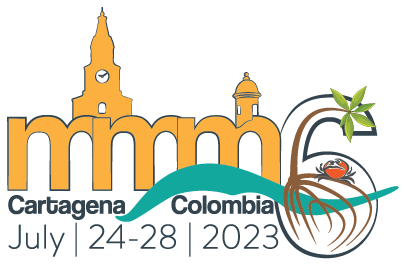05 Jul More leaders in global sustainability join the course “Mangroves as Foundations for the Blue Economy”
Bogotá, Colombia – Following the announcement of the participation of the Grupo Interconexión SA ESP (ISA) and Fundación Argos in the international course “Mangroves as Foundations for the Blue Economy”, more leaders in sustainability from around the world are signing up for this unique opportunity to learn about mangroves through experiential activities in the Ciénaga Grande de Santa Marta on Colombia’s Caribbean coast. The most recent additions to the group include representatives from diverse sectors committed to decarbonization and sustainability, thus enriching the interdisciplinary and intersectoral approach envisioned by the course organizers.

New participants in the course include leaders from academic and research institutes including the Faculty of Marine Sciences at the University of Colima in Mexico; the Bocas Del Toro Research Station of the Smithsonian Tropical Research Institute in Panama which works to increase and share knowledge about the past, present and future of tropical ecosystems and their relevance to human welfare; and the CIFOR-ICRAF research center in Brazil, world leaders in building, disseminating and applying evidence about the role of trees, forests and tree-based agriculture as pathways to solving global crises.
Dr Julieta Hernández López, professor in the Faculty of Marine Sciences at the University of Colima who will participate in both the “Mangroves as Foundations for the Blue Economy” course and the VI Mangrove Macrobenthos and Management meeting explains: “I hope to learn about the most cutting edge methodologies for the determination of Blue Carbon in mangrove systems and to complement my existing knowledge. Additionally, meeting people from similar areas and sharing knowledge and experiences could facilitate collaborations with researchers and practitioners from other countries with common interests. I am currently beginning a few projects in this area, which is why I believe this course will be highly useful for my current and future research.”

In addition, decision-makers from governmental organizations including the Ministry of Fish and Marine Resources of Yemen and the Ministries of the Environment of Ecuador and Panama. The World Bank has facilitated the participation of these representatives from Ecuador and Panama through its CMAR initiative focused on the Eastern Tropical Pacific Marine Corridor, thus reaffirming its commitment to accompanying the countries of the region in the search for actions that protect their marine biodiversity and promote a blue, sustainable and resilient economy that positively impacts the lives of the entire population.
From across the Pacific Ocean, a delegate of the Shenzhen Mangrove Wetlands Conservation Foundation, China’s first public founded organization focused on environmental protection, and the first NGO ever to operate a government mandated ecological park – the Futian Mangrove Ecological Park – has also registered to join the course and to share experiences of mangrove protection and restoration.

Finally, the course organizers are pleased to announce the recipients of the three scholarships offered by CEMarin, TRAJECTS and CAPAZ: Jorge Enrique Casas Mosquera and Ballantyne Puin Castaño, students of the Masters in Environment and Development at the National University of Colombia and Yennifer Lorena Hoyos-Cazulú, a student of the Masters in Marine Science at the Jorge Tadeo Lozano University. All of the applications received were of a very high standard but these three early stage researchers stood out for their personal and professional commitments to projects based around the blue economy and global sustainability.

According to Dr Andrés Osorio, CEMarin Executive Director and General Coordinator of the course, this varied and highly-qualified cohort of registered participants is exactly what the organizers hoped to achieve: “Such a rich and diverse pool of participants on the course is perfect to facilitate the sharing of knowledge and experiences around the potential of mangroves, the blue economy, and the ways in which actors from different sectors can collaborate to develop new strategies and initiatives aimed at local, national, regional and global sustainable development. On behalf of all of the organizers, I am more excited and motivated than ever to welcome our participants to Colombia for what I am sure will be an unforgettable and productive experience.”
The final places on the course remain available but are filling up fast. Don’t miss out on this opportunity to join those who have already registered and to improve your own knowledge and skills in this area to help you make your own contributions to the blue economy.





